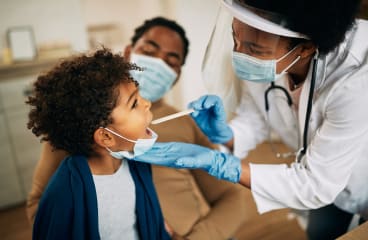
Overview
The coronavirus disease (COVID-19) is caused by a virus. Symptoms may include a fever, a cough, and shortness of breath. Your child may also have a stomachache or belly pain and may not feel like eating.
COVID-19 can spread through droplets from coughing, sneezing, breathing, and singing. It also can spread when people are in close contact with someone who is infected.
Some children have no symptoms. But most children have mild symptoms and can be cared for at home. If symptoms get worse, they may need care in a hospital. Treatment may include medicines to reduce symptoms, plus breathing support such as oxygen therapy or a ventilator.
It's important to not spread the virus to others. If your child has COVID-19, they should:
- Wear a mask anytime they're around other people. A mask can help stop the spread of the virus. Children under 2 years of age should not wear a mask.
- Stay away from others in the home. When possible, your child should stay in a separate bedroom and use a separate bathroom.
- Stay home. Your child should only leave home to get medical care.
Follow-up care is a key part of your child's treatment and safety. Be sure to make and go to all appointments, and call your doctor if your child is having problems. It's also a good idea to know your child's test results and keep a list of the medicines your child takes.
How can you care for your child at home?
- Make sure your child gets extra rest. It can help them feel better.
- Have your child drink plenty of fluids. This helps replace fluids lost from fever, vomiting, or diarrhea. Fluids may also help ease a scratchy throat.
- If your doctor prescribed medicine for COVID-19, give it to your child exactly as directed.
- Ask your doctor if you can give your child acetaminophen (Tylenol) or ibuprofen (Advil, Motrin) for fever or muscle and body aches. Do not use ibuprofen if your child is less than 6 months old unless the doctor gave you instructions to use it. Be safe with medicines. Read and follow all instructions on the label. Do not give aspirin to anyone younger than 20. It has been linked to Reye syndrome, a serious illness.
- Use petroleum jelly on your child's sore skin. This can help if the skin around their nose and lips becomes sore from rubbing a lot with tissues. If your child is using oxygen, use a water-based product instead of petroleum jelly.
- Keep track of symptoms such as fever and shortness of breath. This can help you know if you need to call your doctor. Ask your doctor when it's safe for your child to be around other people.
How can you protect yourself?
Wear a mask around other people and around the child who is sick. Wash your hands often and well. Use soap and water, and scrub for at least 20 seconds. Get tested for COVID-19. You may need more than one test. If you test positive, isolate and call your doctor.
When should you call for help?
Call 911 anytime you think your child may need emergency care. For example, call if your child has life-threatening symptoms, such as:
- Severe trouble breathing. (Your child can't talk at all.) Young children may have flared nostrils, and their belly moves in and out with every breath.
- Sunken eyes, refusing fluids, or not urinating much. (These are signs of dehydration.)
- Constant chest pain or pressure.
- Severe dizziness or lightheadedness.
- Confusion or trouble thinking clearly.
- Pale, gray, or blue-colored skin or lips.
- Loss of consciousness (your child passes out) or is very hard to wake up.
Call your child's doctor now or seek immediate medical care if:
- Your child has moderate trouble breathing. (They can't speak a full sentence.)
- Your child is coughing up blood.
- Your child has signs of low blood pressure. These include feeling lightheaded; being too weak to stand; and having cold, pale, clammy skin.
- Your child has an ongoing fever with new or worsening: belly pain, vomiting, diarrhea, rash, red eyes, or dizziness. These may be symptoms of MIS-C, a condition associated with COVID-19.
Watch closely for changes in your child's health, and be sure to contact your doctor if:
- Your child's symptoms get worse.
- Your child is not getting better as expected.
If you go to the doctor's office, wear a mask. Children under 2 years of age should not wear a mask.
Current as of: November 28, 2025
Author: Ignite Healthwise, LLC Staff
Clinical Review Board
All Ignite Healthwise, LLC education is reviewed by a team that includes physicians, nurses, advanced practitioners, registered dieticians, and other healthcare professionals.

